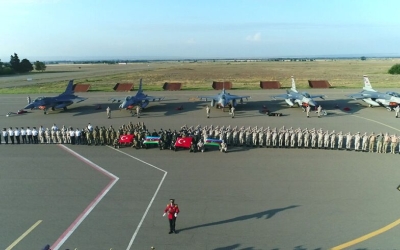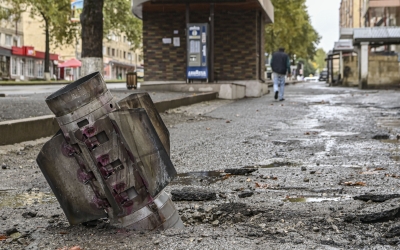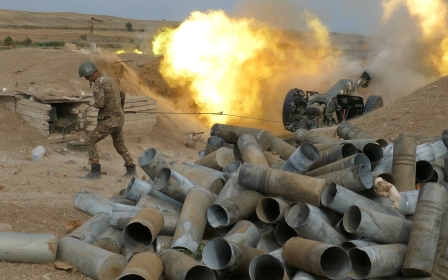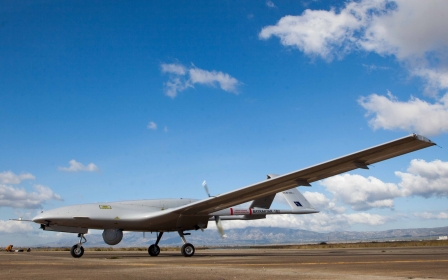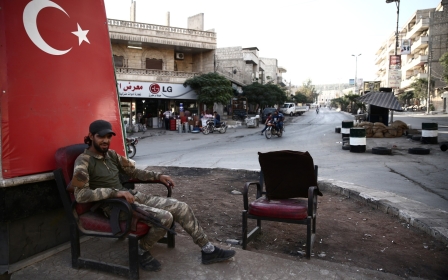Azerbaijan-Armenia conflict: How Israel and Turkey became strange bedfellows
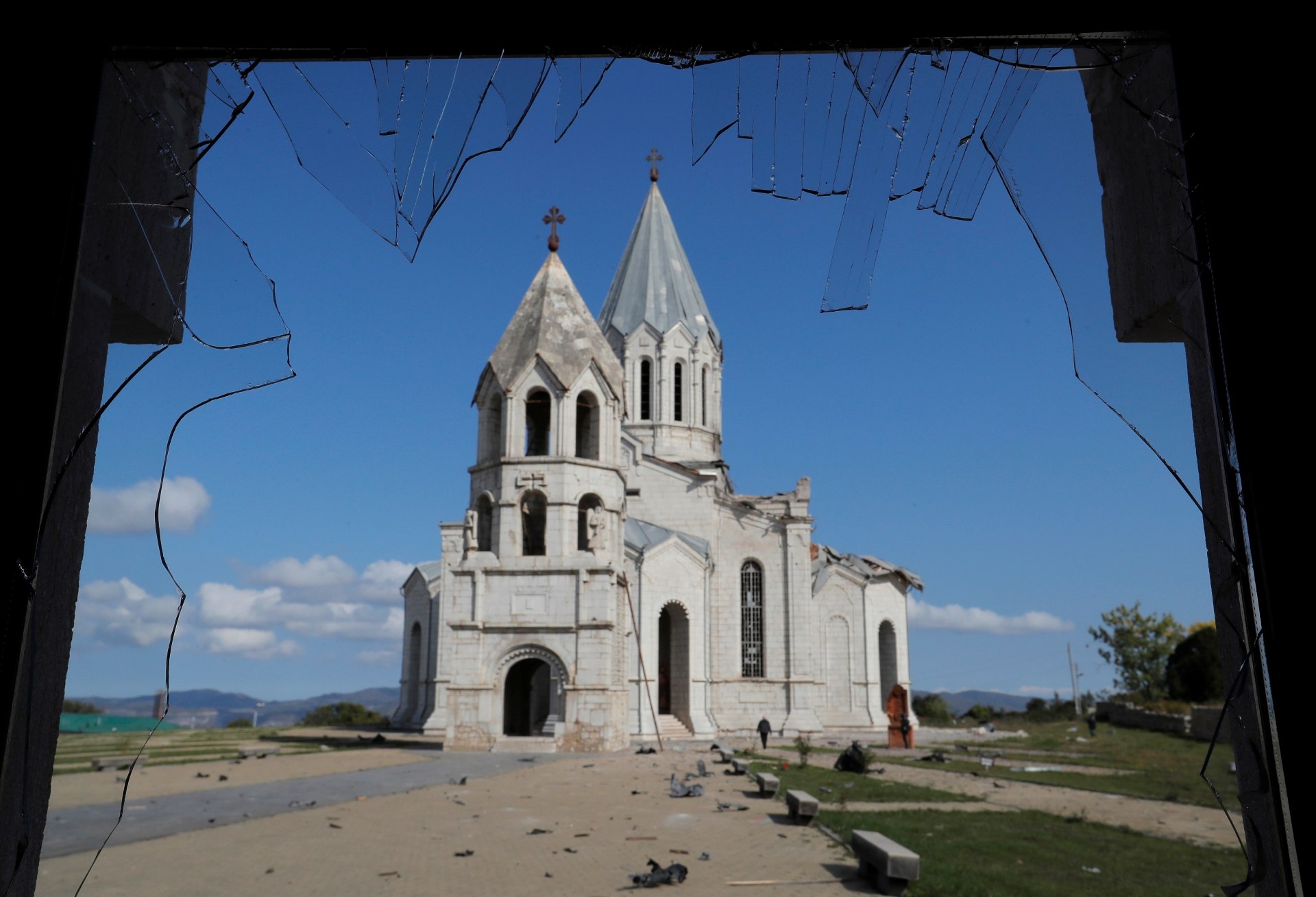
The Caucasus war between Azerbaijan and Armenia over the disputed Nagorno-Karabakh region creates strange bedfellows and leaves sectarian considerations at the door.
Though Azerbaijan is predominantly Shia, Christian Armenia is favoured by Iran, a third of whose population is of Azeri descent, including Supreme Leader Ali Khamenei.
Even more unusual is the strange coupling of Turkey and Israel, which are hostile to one another both diplomatically and in terms of security. Yet both states, dominated by their Sunni and Jewish communities respectively, support and arm Azerbaijan.
Russia, which has a military air base in Armenia, repeats its policy in Syria by working with several parties at once.
The war - which has seen the most intensified military clashes since the 1988-1994 conflict between Armenia and Azerbaijan - broke out on 27 September. Both sides accuse each other of violating the fragile ceasefire.
During the current conflict over Nagorno-Karabakh, in which 300 uniformed troops and civilians on both sides have been killed so far, Israel has increased its military assistance to Azerbaijan.
At least four Ilyushin Il-76 planes, operated by the Azerbaijani cargo airline Silk Way, which serves Baku’s defence ministry, have landed and taken off from the Israeli Uvda military air base in southern Israel. According to flight regulations, that is the only airport from which planes loaded with explosives are allowed to take off.
The Silk Way fleet flew directly from Baku to Uvda and back, according to its flight path documented on various websites that monitor air traffic. Some of these planes have also flown from Baku to Ankara and Istanbul and back over the last two weeks.
Turkish ties
Since 1957, Israel and Turkey have developed secret but close relations, and became strategic allies coordinating with American and British interests in the region. Their common enemies were first Egypt (until the 1979 Israeli-Egyptian peace treaty), Syria and later the Islamic Republic of Iran.
The Israeli intelligence community - Mossad and the military intelligence - developed very intimate ties with the Turkish MIT agency and Ankara’s military. Israel had a listening post in Turkey and the two sides worked hand in hand to spy on their common enemy Syria. Occasionally, Turkey was assisted by Mossad in the battle against Turkish Kurds.
Over the years, especially in the 1980s and 1990s, Israel’s defence industries sold arms to Turkey, which included intelligence equipment, missiles avionics and upgraded tanks and planes. The overall volume of the deals was nearly $10bn.
Ironically, among the systems sold to Turkey were drones and technology manufactured by Israel Aerospace Industries (IAI), which helped Ankara build a comparable industry. Turkish Bayraktar drones are now in action in Nagorno-Karabakh’s battlefields, as well as in Iraq, Syria and Libya.
Turkey, which once had a zero-conflict policy with its neighbours, is currently in conflict with several of them: Syria, Russia, Iraq, Israel and Greece. The beginning of the 21st century and the emergence of Recep Tayyip Erdogan as Turkey’s strongman saw Ankara's gradual move away from its previous strategy.
Erdogan reduced Turkey’s relations with the West and strengthened ties to Qatar, the Hamas movement and Muslim Brotherhood branches across the region. Meanwhile, it is involved in civil wars and military or intelligence interventions in Syria, Iraq, Libya, Yemen and Somalia.
This shift in strategy included severing Turkey’s military and intelligence cooperation with Israel, though trade and touristic ties continue to flourish.
Cashing in
Searching for a new market for its military armaments and for a new Muslim ally in the region, Israel found Azerbaijan. Particularly since 2010, the two countries have formed a strategic alliance, backed by the US, against their mutual foe Iran.
Mossad chiefs, senior military officers and cabinet ministers frequently visit Baku, and their Azeri counterparts reciprocate with meetings in Tel Aviv. Four years ago, Prime Minister Benjamin Netanyahu, on his way to Kazakhstan, stopped over for seven hours in Baku.
It was sufficient time for the Azeri president, Ilham Aliyev, an autocrat known for violating human rights and harshly suppressing any opposition, to reveal openly for the first time that Azerbaijan had purchased weapons from Israel to the tune of $5bn. Since then, the volume has increased and is estimated now to be at $7bn.
All Israel’s major military and security firms benefit from Azerbaijan’s eagerness to be armed to the teeth. According to some reports, IAI, Elbit, Rafael and other smaller defence companies are selling Baku just about anything. This includes artillery, missiles, naval vessels, intelligence equipment and more.
Almost all the Israeli companies that make drones, including attack or self-destructing kamikaze or suicide ones, have sold their wares to the Azeri army. Armenian spokesmen have said in the past that some of these, including ones made by Aeronautics Ltd., were downed during incidents along the border with Azerbaijan.
All Israel’s major military and security firms benefit from Azerbaijan’s eagerness to be armed to the teeth
Other reports claimed that Israel’s Iron Dome anti-missile and rocket system was also sold to Azerbaijan, and it may well be that it is already being used in the battlefields in Nagorno-Karabakh to intercept Russian-made rockets launched by Armenia.
To cover and balance some of the rising cost of the weapons, Israel buys oil from Azerbaijan.
Moreover, according to foreign sources, Mossad established a station in Azerbaijan, serving as the “eyes, ears and springboard” for monitoring Iran. According to these reports, Azerbaijan prepared an airfield that would assist Israel in case it attacked Iran. Other reports claimed that the Iranian nuclear archive that was stolen by Mossad agents in Tehran two and a half years ago was smuggled to Israel through Azerbaijan.
Spokesmen at the Israeli defence and foreign ministries declined to comment, while a spokeswoman from Armenia’s ministry of foreign affairs called upon Israel to stop military sales to Azerbaijan.
As usual with Israel when it comes to its security interests, there is no room for other considerations such as human rights, universal values and morality. For years Israel - which considers itself to be the homeland of the Jewish people and the bulwark against a repeat of the Holocaust - has refused to recognise the Armenian Genocide during the First World War.
The Israeli pretext was to not anger Turkey. But even now, when Erdogan is bashing Israel almost daily and the need to placate him has subsided, Israel still refuses, using an old-new excuse: Azeris are friends of Turkey, so don’t rock the boat.
This article is available in French on Middle East Eye French edition.
Middle East Eye delivers independent and unrivalled coverage and analysis of the Middle East, North Africa and beyond. To learn more about republishing this content and the associated fees, please fill out this form. More about MEE can be found here.


